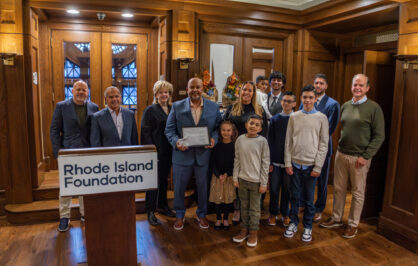
Media release
Nonprofits can apply for $1.7 million for opioid recovery and support services
Partnership between Rhode Island Foundation and Executive Office of Health and Human Services is fully funded with Opioid Settlement Agreement dollars
The Rhode Island Foundation, in partnership with the McKee Administration’s Executive Office of Health and Human Services, is accepting applications for $1.7 million in grants to help address the state's opioid crisis. The Foundation will make grants in three categories: Family Supports, Basic Needs Supports and Trauma Supports.
“Addressing the overdose epidemic and expanding the continuum of care for substance use disorder is a key part of our Administration’s 2030 agenda to enhance public health and wellness,” said Governor Dan McKee. “Based on the recommendations from the Governor’s Overdose Task Force, we are grateful that the Rhode Island Foundation will operate this grant program on behalf of the State. These critical grants will help fund trauma supports, family supports and basic needs supports in our communities.”
In the Trauma Supports category, $1 million is available to fund innovative, trauma-informed services targeting first responders, including peer harm reduction and recovery specialists. Proposals should focus on addressing post-traumatic stress due to the sharp rise in overdoses.
“As this tragic epidemic goes on, we know that people who work on the front lines are increasingly experiencing PTSD,” said David N. Cicilline, the Foundation’s president and CEO. “We must address the impact of those day-after-day experiences on EMTs, police officers and peer counselors before they lead to burnout and other health problems.”
According to the state Department of Health, more than 430 Rhode Islanders died of accidental overdose deaths in 2022, the last year for which there is final data. The annual number of drug overdose deaths in Rhode Island has jumped nearly 40 percent since 2019, largely due to the presence of fentanyl. In 2022, almost three out of every four overdose deaths involved illicit fentanyl.
“We are pleased to once again partner with the Rhode Island Foundation on this important initiative,” said Secretary Richard Charest. “This is the second round of funding from the partnership. Last year, the Foundation collaborated with EOHHS to award $3.25 million in grants to 15 nonprofit organizations to address opioid use, treatment and prevention.”
In the Family Supports category, $450,000 is available to support programming by organizations made up of or serving families of people who use drugs, people in recovery or people who have passed away because of an overdose.
In the Basic Needs Support category, $250,000 is available for organizations that support individuals and families who are impacted by substance use or opioid use or who are at risk of an overdose by providing funding for “care packages,” such as bedding, food, clothing and transportation among other expenses.
Applicants for any of the grant programs must display an overall focus on equity in their work and must align their applications with the Rhode Island Opioid Settlement Agreement Guiding Principles. More information can be found in the grant program specifications.
The Foundation anticipates making two to six grants in each category. Grants will be for one year and the deadline to apply is Feb. 12.
The funding comes from the settlements secured by Attorney General Peter F. Neronha. Rhode Island has executed both national and Rhode Island specific opioid settlements with manufacturers, distributors, pharmacies, and consultants that perpetuated the opioid epidemic, leading to $330 million in funding and life-saving medication to support state and local efforts to address Rhode Island’s opioid crisis. Most recently, Rhode Island executed settlements with CVS, Walgreens, and Walmart, securing $56 million for the state.
“We are glad that the resources from the opioid settlements are already making a real difference in the lives of Rhode Islanders,” said Attorney General Neronha, whose office led the state’s settlement negotiations. “I am thankful to our partners at EOHHS, the Rhode Island Foundation, and the community organizations carrying out this important work for their commitment to addressing this crisis with meaningful action and prioritizing the health and safety of all Rhode Islanders.”
Pursuant to the various settlement agreements, all the funds are required to be directed to opioid abatement – including expanding access to opioid use disorder prevention, intervention, treatment and recovery. Rhode Island’s prevention priorities are to prevent overdoses, overdose deaths and opioid misuse by identifying, developing and evaluating multi-level strategies and interventions.
The Settlement Agreement states that all the funds will be directed to opioid abatement – including expanding access to opioid use disorder prevention, intervention, treatment and recovery. Rhode Island’s prevention priorities are to prevent overdoses, overdose deaths and opioid misuse by identifying, developing and evaluating multi-level strategies and interventions.
For more information about applying for funding from the Opioid Settlement Impact and Recovery Grants Program, visit rifoundation.org.
The Executive Office of Health and Human Services (EOHHS) serves as the principal agency of the executive branch of state government (R.I.G.L. §42-7.2-2) responsible for overseeing the organization, finance and delivery of publicly funded health and human services. EOHHS directly administers the State Medicaid Program and provides strategic support and direction to Rhode Island’s other health and human services agencies. The agency's mission is to foster and strengthen a community-driven, equitable, comprehensive, responsive, and high-quality health and human services system in Rhode Island.
The Rhode Island Foundation is the largest and most comprehensive funder of nonprofit organizations in Rhode Island. Through civic leadership, fundraising and grant-making activities, often in partnership with individuals and organizations, the Foundation is improving the lives of all Rhode Islanders.



